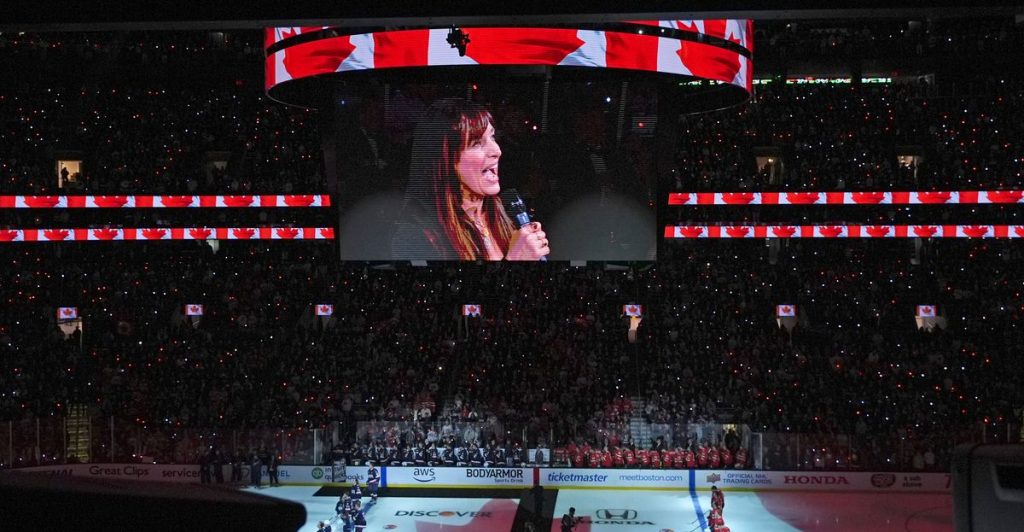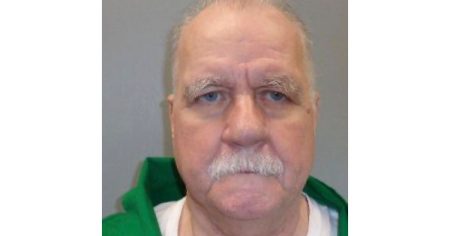A Powerful Anthem Protest: Chantal Kreviazuk’s Bold Statement During the 4 Nations Face-Off
Introduction: A Moment of Defiance on a Global Stage
On Thursday night, February 20, 2025, the 4 Nations Face-Off championship game served as more than just a stage for hockey. It became a platform for a bold political statement when Canadian singer Chantal Kreviazuk subtly altered the lyrics of "O Canada" during her performance of the national anthem. This act of defiance was a direct response to U.S. President Donald Trump’s repeated remarks about Canada potentially becoming the 51st state. By changing the lyric from "in all of us command" to "that only us command," Kreviazuk used her voice—not just to sing, but to speak out. Her actions sparked a mix of reactions, from light booing in Boston to widespread admiration for her courage. This moment highlights the intersection of sports, politics, and art, showing how even subtle gestures can carry significant weight in today’s polarized world.
The Singer and Her Message: Chantal Kreviazuk’s Stand for Sovereignty
Chantal Kreviazuk, a renowned singer-songwriter from Winnipeg, Manitoba, is no stranger to using her platform to express her beliefs. In an interview with the Associated Press, she explained that her decision to alter the anthem’s lyrics was rooted in her commitment to democracy and her belief in Canada’s sovereignty. "I believe in democracy, and a sovereign nation should not have to be defending itself against tyranny and fascism," she said. Kreviazuk’s statement was a clear rebuke of Trump’s comments, which have been a point of contention between the two nations.
To ensure she didn’t falter during her performance, Kreviazuk wrote the modified lyric, "that only us command," on her left hand using mascara. She later shared a photo of this on Instagram, accompanied by emojis of the Canadian flag and a flexed muscle, symbolizing strength and resilience. Her actions were not just about protest but also about inspiring others to find their voice. "I just put it on there so if I ever had a moment and I kind of froze, I would be able to look at my hand and see it," she remarked. For Kreviazuk, this was not just a performance—it was a declaration of her values and a call to action for others to express themselves authentically.
The Political Backdrop: Tensions Between Two Neighbors
The context of Kreviazuk’s protest cannot be separated from the broader tensions between the U.S. and Canada under Trump’s presidency. In recent weeks, Trump has repeatedly suggested that Canada could become the 51st state, a proposal tied to ongoing trade disputes and threats of tariffs. These comments have been met with strong opposition from Canadian leaders, including Prime Minister Justin Trudeau, who has unequivocally stated that Canada will remain an independent and sovereign nation.
The issue was even raised during a news conference with David McGuinty, Canada’s Public Safety Minister, who dismissed the idea of Canada becoming a U.S. state as a "non-starter." McGuinty’s response reflected the broader sentiment among Canadians: a steadfast commitment to their nation’s autonomy and identity. The situation is a stark reminder of how political rhetoric can spill over into sports and culture, creating moments of tension and solidarity alike.
Reactions and Reflections: A Mixed Response from the Crowd
Kreviazuk’s performance drew a mixed reaction from the audience in Boston, where the game was held. Some fans lightly booed during the anthem, though their disapproval was quickly drowned out by the singer’s powerful voice. The scene was reminiscent of another recent incident in Montreal, where the crowd at the Bell Centre booed "The Star-Spangled Banner" before a U.S.-Canada matchup. These reactions underscore the emotional and often divisive nature of sports when intertwined with nationalism and politics.
Despite the booing, Kreviazuk’s decision resonated with many who admired her willingness to take a stand. Her courage to alter the anthem—a symbol of national pride—was seen as a bold act of resistance. For some, it was a reminder of the power of art to challenge authority and spark dialogue. For others, it raised questions about the appropriateness of using a national anthem as a vehicle for political protest, highlighting the fine line between activism and disrespect.
Hockey, Nationalism, and the NHL’s Neutral Stance
The National Hockey League (NHL) declined to comment on the situation, choosing to maintain its neutrality in the face of a politically charged moment. This decision was consistent with the league’s typical approach to such controversies, as it seeks to avoid taking sides in debates that could alienate fans or players.
However, the incident cannot be entirely separated from the NHL’s role in fostering a sense of national identity. Hockey is often seen as a unifying force in Canada, and the anthem is an integral part of the pre-game tradition. Kreviazuk’s actions, therefore, occurred at a moment when emotions were already running high, both on and off the ice. The fact that the U.S. team received a pre-game call from Trump, wishing them luck and expressing hope for a victory "for our country and for Trump," added another layer to the story. It highlighted the interconnectedness of sports and politics and the ways in which public figures can influence the narrative around events like these.
Conclusion: The Intersection of Art, Activism, and Identity
Chantal Kreviazuk’s decision to alter the lyrics of "O Canada" during the 4 Nations Face-Off championship game was more than just a moment of defiance. It was a testament to the enduring power of art as a tool for activism and self-expression. At a time when political tensions between the U.S. and Canada are running high, Kreviazuk’s actions served as a reminder of the importance of standing up for one’s beliefs, even in the face of adversity.
Her decision also raised important questions about the role of artists in addressing political issues. Should performers use their platforms to make statements about the world around them, or should they focus solely on entertaining? For Kreviazuk, the answer was clear: "Sometimes you just got to speak the truth in your art, and it’s awesome. That’s what it should be about."
As the U.S. and Canada continue to navigate their complicated relationship, moments like these will undoubtedly continue to emerge. They serve as a reminder that, even in the most unexpected places, the boundaries between sports, politics, and culture are constantly blurring. And when they do, it is up to individuals like Chantal Kreviazuk to decide how they will use their voice—or in this case, their lyrics—to make their stance known.















